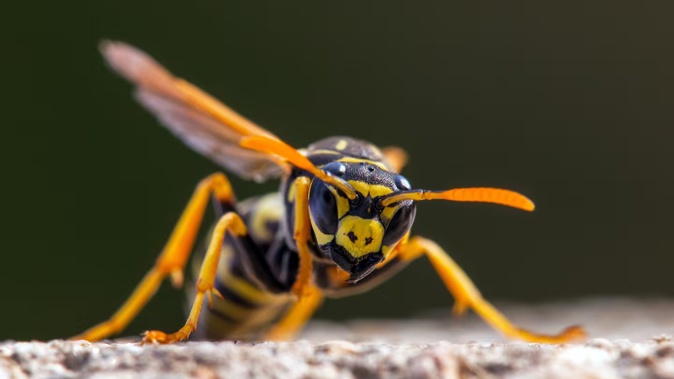
- Council rangers are reporting unusually high numbers of wasps around some Auckland parks.
- An ecologist said New Zealand’s wasp population has surged following a warm, dry summer and a “high year” in its normal cycle.
- People are being urged not to attack wasp nests during day time.
A long, dry summer has led to “extremely high” numbers of wasps around the country – and Kiwis are being warned not to attack nests during daytime.
New Zealand has one of the world’s highest recorded densities of German and common wasps, which typically surge in numbers following a lengthy spell of warm and dry weather.
University of Auckland ecologist professor Jacqueline Beggs said wasp population dynamics also tended to be cyclical.
“So, a low year is followed by a high year – and this year the stars have aligned for wasps to reach extremely high numbers.”
Auckland Council senior ecological specialist Sarah Gibbs said officers had noticed unusually high wasp activity in some parks around the region.
“This may be attributable to the general warming trend attributed to climate change – including another year of record-breaking average temperatures, combined with dry summer conditions.”
Wasp stings were painful enough for people, but the brightly-coloured pests also had a devastating impact on our native species.
“They kill lots of insects and feed on young, native birds in nests,” said Beggs, who directs the university’s Centre for Climate, Biodiversity and Society - Ngā Ara Whetū.
“They are very efficient foragers and can tackle prey that are way bigger than them. They can sting and immobilise weta and large dragonflies, carving them up and taking the pieces back to their nest.”
New Zealand remained a long way from being able to eradicate the tiny invaders entirely, but control was within reach, she said.
“Numbers will be naturally low in many years, so you need to look out for bumper years like this year and go hard on them then,” Beggs said.
Left unattended, wasp nests could grow several metres wide.
In January, it took exterminators two days to destroy a monster nest at a Karaka farm standing about 1.6m high and holding more than 200,000 wasps.
“Some nests survive the winter and are occupied by multiple queens,” Beggs said.
“By the end of the second season, there are millions and millions of wasps.”
Wasp nests happened to be fiercely guarded by female workers and were especially dangerous at this time of year, as larger, older nests had more wasps protecting them.
“January to February is the best time to kill the colony, but it’s not too late to poison wasp nests.”

A long, dry summer has led to “extremely high” numbers of wasps around the country. Photo / Melanie Camoin
While working at Landcare Research, Beggs helped develop Vespex, a toxic bait that wipes out nests of German and common wasps within days.
“As a rule of thumb, we should be reducing our reliance on pesticides and herbicides, but judicious use of wasp poison is incredibly effective and safe.”
Beggs said people sometimes took gung-ho approaches to wasp control, such as mixing up their own toxic concoctions.
She was particularly horrified when these home-brewed poisons contained sugar, which posed a risk to bees and could contaminate honey.
German wasps and common wasps tended to form nests in the ground or clay-covered nests in trees, and taping a spoon to a long stick and gently sprinkling pyrethroid dust on them could kill wasps while avoiding stings.
Gibbs said Vespex didn’t appear to work as well in Auckland compared to the South Island, perhaps because of the region’s higher biodiversity giving wasps more food choices to eat.
“If people find paper wasp nests in their garden, they should wait until the wasps have settled in for the evening and then spray the nest with fly spray,” she said.
“Do not shine a torch on to the nest as they will fly up to it – and the person holding it.”
Jamie Morton is a specialist in science and environmental reporting. He joined the Herald in 2011 and writes about everything from conservation and climate change to natural hazards and new technology.
Take your Radio, Podcasts and Music with you









